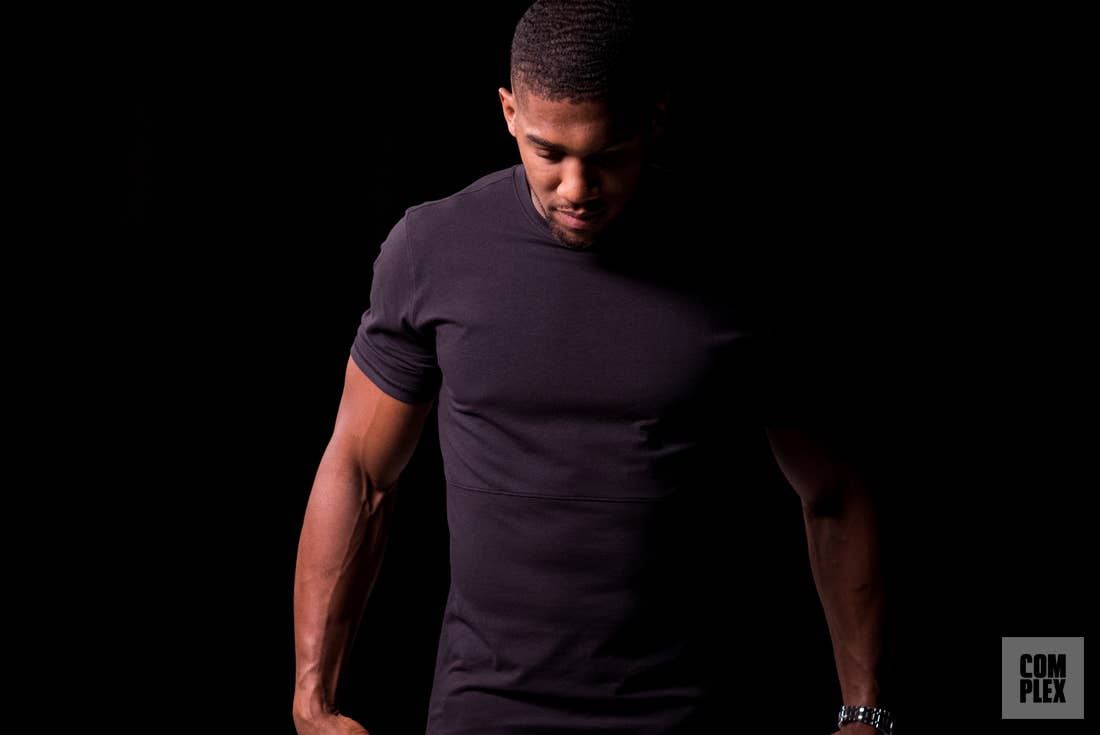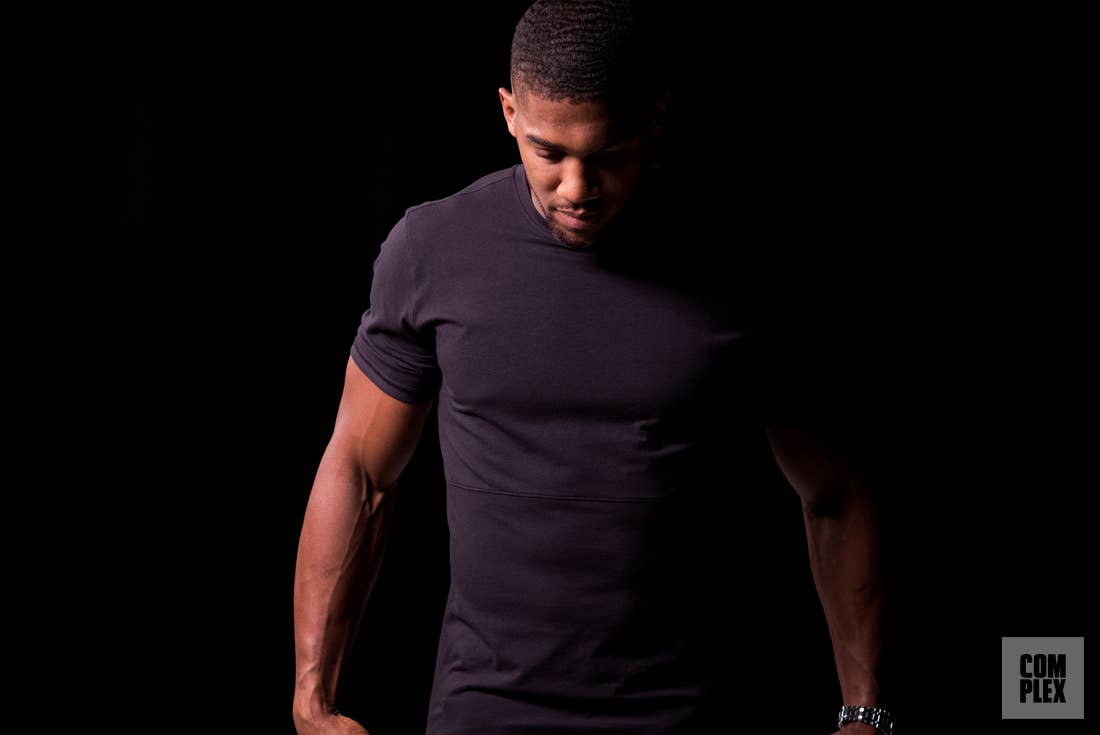
We interrupt Anthony Joshua’s photo shoot in Beverly Hills to hand him an iPhone. On the other end is a fan, FaceTiming from New York, who can’t believe she’s talking to the one of the baddest boxers in the world. It’s early June and Joshua, the unified heavyweight champion from the U.K., is in the middle of a special trip to the United States with Under Armour that will have him roll through Los Angeles, sit courtside at Game 4 of the Western Conference Finals in Oakland, and check out a few other locales for the first time. In the meantime, hours before the Warriors and Rockets tip, Joshua tries to carry on a brief conversation with the fan who can’t seem to hold her composure talking to the champ.
This probably isn’t the first time he’s dealt with an overly excited fan. Joshua laughs it off and hands back the phone that two minutes ago disappeared into his massive mitts. Interactions like that with American boxing fans are much more frequent these days for the immensely popular 28-year-old, who carries a smile perfectly proportional to his massive 6’6”, roughly 240-pound frame. Joshua understands that if you truly want to be a big deal, especially in boxing, you have to leave your mark in America and, low-key, that’s what has brought him here to the States as he begins to drum up interest for the most important fight of his life—and one of the biggest bouts boxing has seen in almost two decades.
Joshua will soon put everything on the line in a historic showdown with American slugger Deontay Wilder. The winner becomes the first undisputed heavyweight champ in 18 years so it’s kind of a big deal. No matter how badly boxing struggles for relevancy amongst the major sports, even casual fans pay attention when the heavyweight championship is up for grabs.
But the man whose profile in the ring continues to rise internationally still largely remains a mystery to many in America and even to some in the industry itself. Known for being a good guy and refusing to play a character, can Joshua earn the attention of a new audience and convince his haters he’s authentic? Does he even care?
“What am I like? Am I different? I say there will be many ways to define me when it’s all said and done,” Joshua says.
With only 21 fights as a professional under his belt, including his epic showdown in 2017 with Wladimir Klitschko many declared the fight of the year, Joshua is the holder of four of the five heavyweight championships. But is he one of the best pound-for-pound boxers in the world, or just a product of the current state of the division that’s extremely top heavy? Joshua, if you ask him, doesn’t think he belongs on the mythical list. “I’m not good yet,” he says.
Joshua thinks he’s only scratching the surface of his talent, having shed bad habits and narrowed his focus recently. But he’s not exactly living out a dream considering he never fantasized about being heavyweight champion of the world. So what’s he boxing for? And, most importantly, if he hasn’t been ducking Wilder then why did it take so long to come to a preliminary agreement on the fight everyone wants to see? There are many questions Anthony Joshua needs to answer as he tries to gain the attention of American fans. He’s ready to address them.
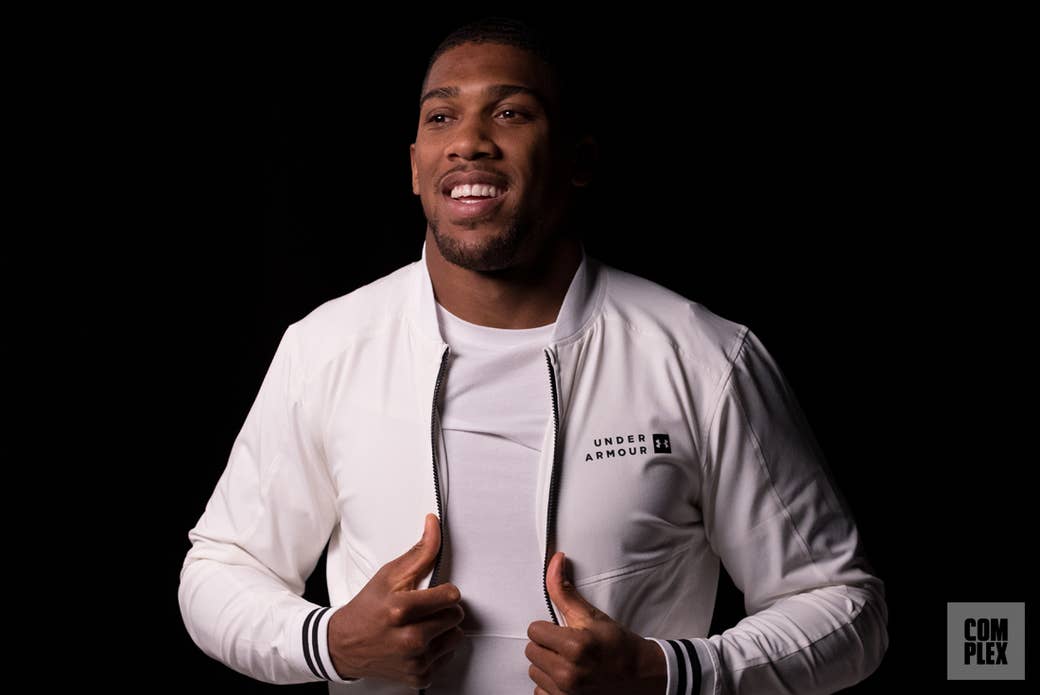
Let’s get the most important one out of the way first because—real talk—that’s what boxing enthusiasts and casual fans really care about. Joshua (21-0, 20 KO), pegged by Forbes as the second highest paid boxer in the world over the last 12 months, made a reported $32 million in the ring. He stands to make nearly double that fighting Wilder (40-0, 39 KO). While making a fight of that magnitude a reality, against a challenger who personality and style wise is the exact opposite of Joshua, is much easier said than done. But what’s taken so long?
Wilder, 32, has been circling Joshua for years now. The WBC heavyweight champion of the world who hails from Alabama, wants—no needs—a unification match. And he hasn’t been shy voicing that or his displeasure with the delays. With their toughest challenges now out of the way, and mandatories able to be put to the side, logic says it shouldn’t have been a big issue getting their two camps on the same page. But the politics and the behind the scenes bullshit of boxing—with its multiple sanctioning bodies, promotional teams, layers of management, and competing networks—always seem to ruin everyone’s good time.
The 6’7”, roughly 220-pound Wilder, known for his unorthodox technique but devastating right hand, thinks Joshua’s been ducking him. The Bronze Bomber has told anyone who will listen—including Complex—the onus fell on Joshua and his camp to make the fight happen. “I think it’s childish what they’re doing, manipulating the people," Wilder told us back in March when Joshua was rumored to want one more fight after facing Joseph Parker April 1st before agreeing to meet Wilder. Joshua says it goes both ways and a certain amount of respect is required since he owns more hardware.
“When you’re talking about facts and stats, four belts to one,” Joshua says. “Just have a little bit of respect when it comes to negotiating.”
The way Joshua sees it, he’s the one commanding crowds of 80,000 fans or more for his championship fights in the U.K. He’s the one with the higher international profile. He’s the one on the Forbes 100 Highest Paid Athletes List. Atop the list is Floyd Mayweather, the man Joshua spent time visiting in Las Vegas last year before the Mayweather-McGregor bout and the name he invokes to justify why his terms for the Wilder fight must be met before he formally agrees to anything.
"When you're talking about facts and stats, four belts to one. So just have a little bit of respect when it comes to negotiating."
“I feel, speaking in the words of Floyd Mayweather, I’m definitely the A-side,” says Joshua.
While an agreement in principle has reportedly been reached, it’s still not a done deal. Buzz ramped up months ago when a reported $50 million offer was submitted to Joshua’s team by Wilder’s. That sounded like more than enough to make the fight happen. But higher stakes require the finest of details.
“My view on it is, it’s not complicated,” says Joshua. “In my eyes, just the conversation, like be real about what you’re trying to say. There was a $50 million figure thrown out there, which is very, very lucrative. But it’s the finer details that’s important and that’s what we’re trying to get the bottom of.”
Aside from figuring out each fighter’s share of the PPV take and what networks will televise it, other details like the undercard, the press tour, and ring entrances have to be ironed out. Most importantly, they need to settle on a location for the fight. Reportedly, it will go down in the U.K. where Joshua’s been adamant the bout takes place.
Wilder has said he’ll fight anywhere and Joshua says he has no problem having it take place in the U.S. if that was a true deal breaker. But since Joshua-Wilder is logically at least a two-part series—a rematch is all but certain considering there are no other options as attractive or lucrative as the other in the heavyweight ranks—Joshua thinks it’s only fair that the first one go down where all his other fights have taken place and where his army of supporters can see him. Joshua has regularly filled stadiums five times larger than the biggest crowd Wilder has ever attracted. “My obligation, and what I want for this fight, my request is let’s have it in the U.K. to start with,” says Joshua.
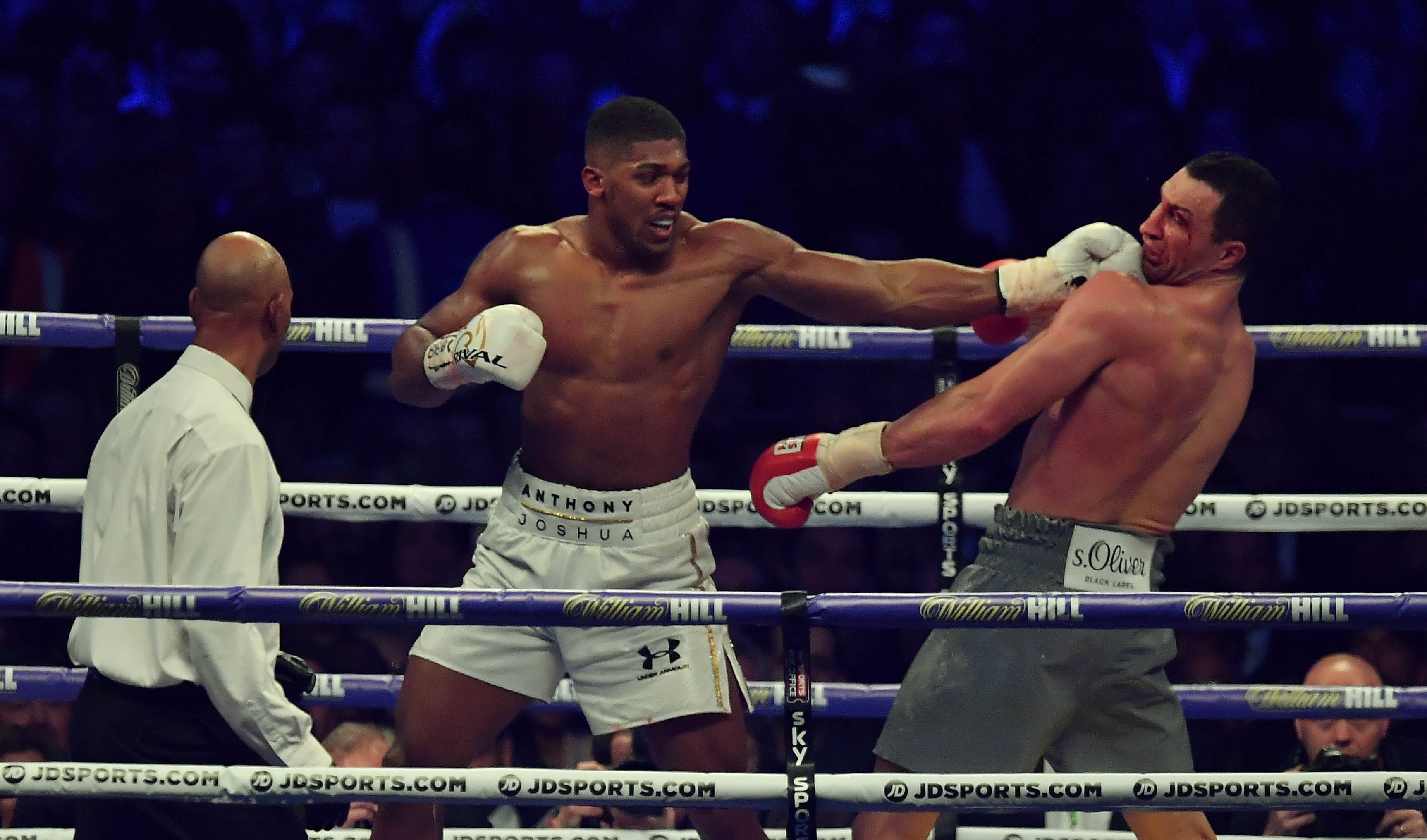
Atypical of most fighters, especially ones that have risen to his heights in such a short period of time, Joshua doesn’t engage in trash talking. Not because he lacks wit. It goes back to his early days in the gym. If you want to stay, shut up and hit the bag.
“I’m not in the business of making headlines,” says Joshua. “I’m in the business of making good fights.”
True, but the more quotes and outrageous sounds bites you give, the more headlines you make. The more headlines you make, the more attention your fight gets. The more attention your fight gets, the more money you make. But you’ll never hear Joshua talk in the third person, a la Mayweather. He has mostly refused to take any bait put out there by Wilder, who’s sound bites often land as hard as his punches.
Joshua’s asked if Wilder’s verbal jabs bother him. When he says you’re afraid to lose, doesn’t that piss you off? When he accuses you of ducking him, why don’t you clap back?
“I’m ducking him? After fighting Klitschko, my 19th fight, it was like, [Wilder was] saying how much of a fan you were of mine,” says Joshua. “He fought Bermane Stiverne and I was going to fight [Carlos] Takam and I hadn’t heard a peep from him. Then he says ‘I WANT JOSHUA!’ after his fight. I called my coach straight away and [promoter] Eddie [Hearn] and I said has he been in touch to arrange this fight and they said no, no, no. So I said, what’s this about? Then I started realizing it is a PR stunt? I said, you know what, let’s get this talk underway because it’s a fight that has to happen and if you’re going to mention my name then you’re going to have to back it up. You don’t ride the wave with my hard work.”
"I'm not in the business of making headlines. I'm in the business of making good fights."
The Klitschko fight was Joshua’s proudest moment in the ring. He was on the brink of being knocked out by the sport’s last great heavyweight in the 6th round but rallied, eventually putting the former champ on the canvas twice in the 11th with devastating right hands and combinations for a resounding win in front of 90,000 at Wembley Stadium.
“I answered a lot of questions that night,” says Joshua. “And that was a wholesome fight. That gave everyone the ingredients, the starters, the mains, and the dessert.”
It was a test unlike any Joshua, a much more technical and tactical boxer than Wilder, had faced. It showed the world he just might be able live up to the hype.
“He can be a dominant heavyweight because he looks the part. But you’re only remembered as good as your rivalry,” says Showtime boxing analyst and former two division world champion Paulie Malinaggi. “Sometimes you’re so good that rivalries don’t really create themselves. Wladimir Klitschko had a problem with that. Anytime you have those big rivalries with other fighters that are really accomplishing other things like you are I think at day’s end it bodes better for you to be remembered in a positive light. It all comes down to those results.”
Wilder is coming off his most impressive performance after he took out Luis Ortiz in a thrilling fight this past March. It was the last domino he had to knock down in order to put the pressure on Joshua’s camp to make their match a reality. It’s the most intriguing fight the sport can make because of its historical significance and the fact these two are huge heavyweights with brutal punching power. Someone will probably be knocked down. Someone will gain everything while the other loses it all. And lucky for us, we’ll get a rematch in the U.S.
“This would arguably be the biggest fight since Lennox Lewis vs. Mike Tyson back in 2002. Though it may not compare with name recognition with Lewis and Tyson, it’s probably even a better fight in the ring," says Stephen Espinoza, Showtime's president of sports and event programming. "Here you have two young champions in their prime, both very articulate, very likable, very marketable, both elite athletes, and that’s something the heavyweight market hasn’t seen in quite some time.”
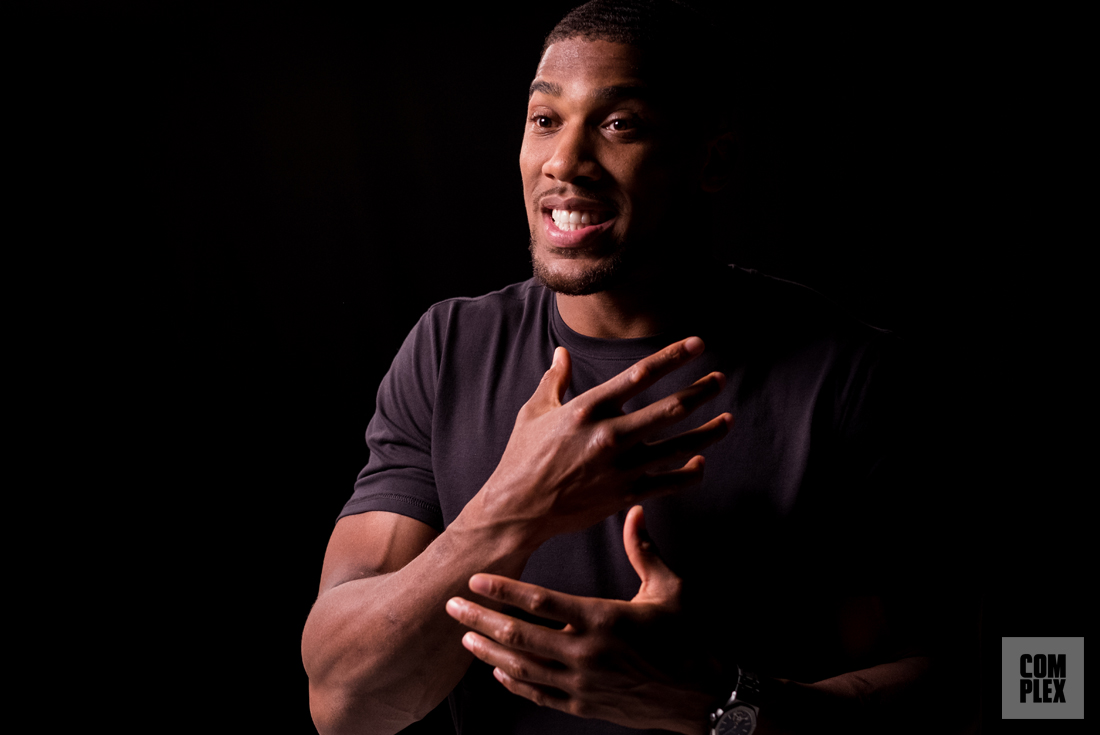
Joshua’s become one of the most recognizable international athletes in the world from humble beginnings. The son of Nigerian immigrants, who proudly displays his heritage on his right shoulder, a tattooed silhouette of Africa, Joshua discovered the sport thanks to a cousin who brought him to a gym. He wasn’t much for throwing hands in the streets unless he really had to, but when he saw the organized chaos of a boxing gym for the first time, it gripped him.
“I’m seeing people scrapping in the gym and I’m hearing people are getting paid, people are getting praised, people are learning how to be a better person,” Joshua recalls. “I thought, you know what, this is up my street.”
By 2012, he was an Olympic gold medalist. By 2016, he was a world titleholder. The year before, Under Armour signed Joshua to its stable of superstars. He’s quite familiar with the Baltimore-based brand’s U.S. endorsers. He finally got a chance to chop it up with Steph Curry before the Warriors-Rockets game and he has a unique relationship with one of the faces of U.A.'s training category, Dwayne “The Rock” Johnson, given the movie star's combat sports background. Joshua says the two have a “mutual respect” and “there’s nothing to gain from the relationship.”
“A.J. is a rare breed in the heavyweight division who has the potential to become one of boxing’s G.O.A.T.s,” says Johnson. “Always improving, sharpening his game, and being the hardest worker in the room. He also has this cool humility about him which is pretty rare for young badass fighters to have. Great dude and proud to call him my boy!”
But Joshua never got into the game to be a G.O.A.T. or one of the most famous athletes in the world. Boxing was about more than punches and paychecks.
“Boxing for me was never to find this one punch power, to be the heavyweight champion of the world,” says Joshua. “It was more so lifestyle, healthy living. Taking wisdom from the older coaches, leaving my ego at the door. Strip me back from everything I once was.”
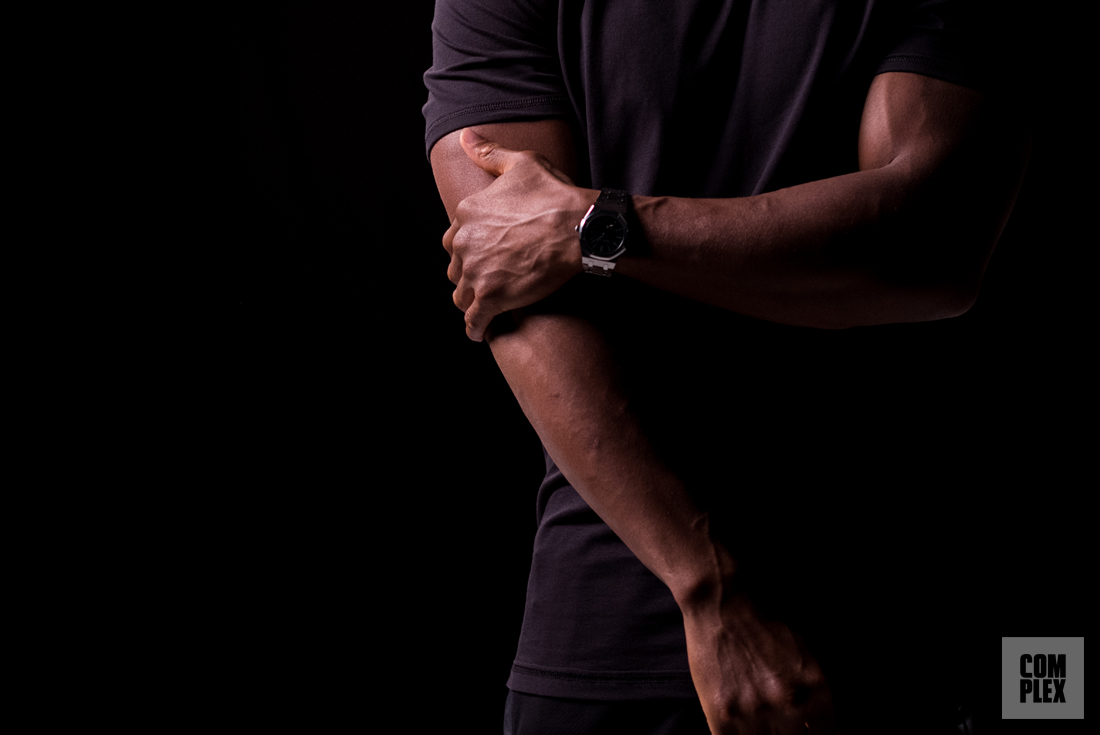
Joshua didn’t grow up in the lap of luxury. He used to be familiar with the streets. He was once a partier who used to enjoy drinking. Not anymore. Not at his age and not with everything on the line he would stand to lose, like his belts, huge paydays, his role model status, and the legacy he talks about leaving. But who is the real Anthony Joshua, a question many around boxing frequently ask.
Talk to enough people and they’ll quietly question the authenticity of the Joshua we see conducting in-ring interviews and chopping it up with media before fights compared to the guy away from the cameras and microphones. Some have thrown around the word fraud.
“Listen, Joshua does have a checkered past, I’ve heard about it,” says Malinaggi. “There is the street in him. But the street in him allows him to read situations better and understand when there is a loaded question or a [potential] controversy to a response and he plays it well.”
Boxers, especially black ones, have been known, and oftentimes forced, to embrace characters, like a wrestler, in order to better market themselves and their fights. Joshua says it never was an option for him. “If I was a character, I would get riled up,” he says.
“The most impressive thing with the enormous amount of fame he’s gotten; Joshua never gives an answer or makes a controversial statement to burn his image,” says Malinaggi. “I can’t explain to you how difficult that is because people are always putting you on the spot when you’re in that position. In that way, he reminds me of a Derek Jeter.”
Joshua actually thinks if he had stayed in the amateur ranks he’d be “more developed as a person and an athlete.” He wishes he had a more formal education—he’s fascinated with accounting and finances—and will readily tell you about the book he’s reading and quote Malcolm X. No matter what, he’s the guy with charisma and the happy go-lucky attitude about life. In a brutal sport like boxing, where pain is always part of the process, how can he have so much chill when everyone is aiming for his head?
“My interpretation of boxing wasn’t what Mike Tyson was, with all due respect. My interpretation of boxing was being able to be social,” says Joshua. “I adapted that role into the pro ranks. I have that spite within me, believe me. We all do if our backs are against the wall. But more than anything, I always learned as a youngster that it’s better to build bridges than enemies.”
Which is why he’s completely cool going off script to make a fan’s day during a photo shoot. Even if said fan is hyperventilating so badly they struggle to ask Joshua a question, the rare one he can’t answer.

